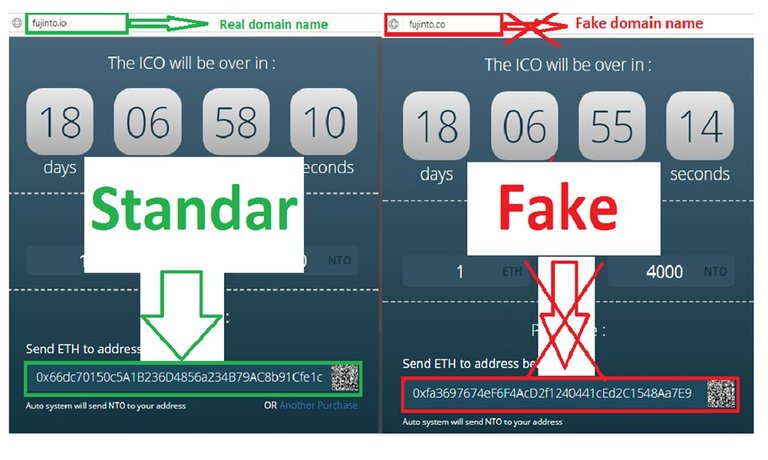The increasingly problematic world of Scam ICOs

Being an investor in an Initial Coin Offering brings with it many potential benefits - feeling like you are the part of something new which can change the paradigm for a particular industry, finding the next lucrative coin, being involved with something early on and shaping its development.

However, ICOs are also a haven for fraudsters. From those who use fake twitter and telegram profiles to solicit for ETH and BTC using fake addresses (the simplest technique, but it seems to work judging by how much this is happening, like a fungus spreading on any tweet or blog post)

There were quite a few scam ICOs in the news recently, one of which was Prodeum, which purchased fiverr services to get their ICO some traction on social media:

They stole their investors cash and left them with the following as a memento:

I myself was victim of a scam ICO when I had just started investing, the http://fujinto.io/ project which promised to revolutionalise the travel industry. The ICO site is still up, if you click on the highlighted link. They seemed to have good report on various ICO benchmarking websites (which have since been removed), had professional-looking social media profiles and even had the chutzpah to make fake copies of their website and build trust by posting on their own site:
"ALERT!! There are some fake site out there trying to scam people who want to join the ICO of NTO tokens. We only have one official website is https://fujinto.io/. All other sites are scam. Please be careful. (e.g. fujinto.co)"
They gave "advice" on how to avoid the fake ICO:
More than anything, I believed in the potential for the project: A "blockchain powered cryptocurrency to be used for hotel bookings and ticket purchases without having to go through major booking sites with exorbitant commission fees." The app mockups looked clean and the social media outlets belonging to Fujinto appeared to be communicating well.

This turned out to be a scam ICO, with the token going onto coinexchange and the fraudsters selling off, before the ICO had even been completed. The tokens were released into wallets very late, and by that point the value of each token was almost one-hundredth of what it was when they had sold. Thereafter they disappeared into the ether, with their ethereum...
I had made the mistake of not doing adequate enough research, and checking that their github repository was basically non-existent.
Their team also had fake linkedin profiles, and from what I can see, don't exist in real life:

I learnt my lesson, thankfully it wasn't too costly. I became learned in the core tenets of spotting a scam ICO:
- Check the team out, do they exist? Are the linkedin profiles real?
- Read the whitepaper. Spelling and grammar mistakes aren't critical (especially given that a lot of ICOs are from countries where English translators are hard to come by), but plagiarism and nonsensical text is.
- If there is a github repository? If so have a look and see if it is just a shell of something or if there is actually some work happening?
- Other "orange flags" include using hyperbolic language or buzzwords. In the case of Fujinto, "Believe me, you don’t wanna miss this app"
Simple but effective tip
One simple tip when checking the team out is "how slick do they look". Now it sounds crazy, but all the scam ICOs use team photos where the team look like Fortune 500 CEOs or headteachers, with images of "trustworthy-looking" people copied and pasted to facilitate their fraud. The Benebit ICO did this, stealing photos from a London High School:


Because nothing says trustworthy more than teacher profile pics. I feel sorry for the headmaster, who wasn't deemed trustworthy-looking enough to be part of the scam. My feeling is:
If members of the team have shadows under their eyes or look like someone you wouldn't want your kids talking to, then generally speaking, you might be safe.
How often do Scam ICOs have team members who look like this:

Good ol' Vitalik does look a little bit dodgy, but appearances are deceiving in the world of crypto. Nevertheless, scam ICOs probably wouldn't use an image like this to advertise themselves.
Of course, this advice is semi-jest and just based on my own observations. Please, please, please, always do your own research. Good luck.
Hi! I am a robot. I just upvoted you! I found similar content that readers might be interested in:
https://toptopic.com/posts/scam-icos-and-my-experience-with-one-plus-simple-tips-to-avoid-them-67973
Your Post Has Been Featured on @Resteemable!
Feature any Steemit post using resteemit.com!
How It Works:
1. Take Any Steemit URL
2. Erase
https://3. Type
reGet Featured Instantly � Featured Posts are voted every 2.4hrs
Join the Curation Team Here | Vote Resteemable for Witness
Your Post Has Been Featured on @Resteemable!
Feature any Steemit post using resteemit.com!
How It Works:
1. Take Any Steemit URL
2. Erase
https://3. Type
reGet Featured Instantly � Featured Posts are voted every 2.4hrs
Join the Curation Team Here | Vote Resteemable for Witness
follow and likes @akhyasad'thanks for steemit users around the world